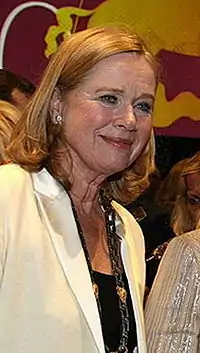 Festival poster | |
| Opening film | The Noah's Ark Principle |
|---|---|
| Location | West Berlin, Germany |
| Founded | 1951 |
| Awards | Golden Bear (Love Streams) |
| No. of films | 315 films[1] |
| Festival date | 17–28 February 1984 |
| Website | http://www.berlinale.de |
The 34th annual Berlin International Film Festival was held from 17–28 February 1984.[2] The festival opened with The Noah's Ark Principle by Roland Emmerich.[3] The Golden Bear was awarded to the American film Love Streams directed by John Cassavetes.[4] The retrospective was dedicated to German-American actor, screenwriter, producer and film director Ernst Lubitsch.[5] The Honorary Golden Bear was awarded to American director Jules Dassin and Greek actress Melina Mercouri and the Homage section was dedicated to the couple.[6]
Jury

The following people were announced as being on the jury for the festival:[7]
- Liv Ullmann, actress (Norway) - Jury President
- Jules Dassin, director, screenwriter and producer (United States)
- Edward Bennett, director and screenwriter (United Kingdom)
- Manuela Cernat-Gheorghiu, film historian (Romania)
- Lana Gogoberidze, director and screenwriter (Soviet Union)
- Tullio Kezich, film critic, playwright and screenwriter (Italy)
- Steffen Kuchenreuther, producer and distributor (West Germany)
- Jeanine Meerapfel, director and screenwriter (West Germany)
- Kevin Thomas, film critic (United States)
- Mario Vargas Llosa, writer and playwright (Peru)
- Adolphe Viezzi, producer (France)
Films in competition
The following films were in competition for the Golden Bear:[1]
Out of competition
- Marlene, directed by Maximilian Schell (West Germany)
- Nosferatu, eine Symphonie des Grauens, directed by F. W. Murnau (Germany)
- Rue barbare, directed by Gilles Béhat (France)
- El señor Galíndez, directed by Rodolfo Kuhn (Argentina, Spain)
- Star 80, directed by Bob Fosse (USA)
- Testament, directed by Lynne Littman (USA)
- Terms of Endearment, directed by James L. Brooks (USA)
- Wanderkrebs, directed by Herbert Achternbusch (West Germany)
Key
† Winner of the main award for best film in its section The opening and closing films are screened during the opening and closing ceremonies respectively.
Retrospective
The following films were shown in the retrospective dedicated to Ernst Lubitsch 1914-1933:[8]
The following films were shown in the retrospective dedicated to Jules Dassin and Melina Mercouri:[8]
| English title | Original title | Director(s) | Country |
|---|---|---|---|
| 10:30 P.M. Summer | Jules Dassin | USA | |
| A Dream of Passion | Κραυγή Γυναικών Kravgi gynaikon | Jules Dassin | Greece, Switzerland |
| Brute Force | Jules Dassin | USA | |
| He Who Must Die | Celui qui doit mourir | Jules Dassin | France |
| Rififi | Du rififi chez les hommes | Jules Dassin | France |
| Not a random story. Melina Mercouri - Jules Dassin | Keine zufällige Geschichte. Melina Mercouri - Jules Dassin | Charlotte Kerr | West Germany |
| Never on Sunday | Ποτέ την Κυριακή Poté tin Kyriakí | Jules Dassin | Greece, USA |
| Night and the City | Jules Dassin | United Kingdom | |
| Phaedra | Φαίδρα Phaedra | Jules Dassin | Greece |
| The Naked City | Jules Dassin | USA | |
| The Rehearsal | Η Δοκιμή I dokimi | Jules Dassin | Greece, United Kingdom |
Films in other sections
The festival's Forum section included a presentation of Memory of the Camps, a 1946 rough cut of the British feature-length account of Nazi wartime atrocities, German Concentration Camps Factual Survey, the significance of the unfinished work having only recently been understood.[9]
Awards

The following prizes were awarded by the Jury:[4]
- Golden Bear: Love Streams by John Cassavetes
- Silver Bear – Special Jury Prize: No habrá más penas ni olvido by Héctor Olivera
- Silver Bear for Best Director: Ettore Scola for Le Bal
- Silver Bear for Best Actress: Inna Churikova for Voenno-polevoy roman
- Silver Bear for Best Actor: Albert Finney for The Dresser
- Silver Bear for an outstanding single achievement: Monica Vitti for Flirt
- Silver Bear:
- Honourable Mention: Jean-Marie Straub, Danièle Huillet for Klassenverhältnisse
- FIPRESCI Award
References
- 1 2 "PROGRAMME 1984". berlinale.de. Archived from the original on 9 November 2013. Retrieved 8 June 2014.
- ↑ "34th Berlin International Film Festival". berlinale.de. Archived from the original on 28 December 2010. Retrieved 21 November 2010.
- ↑ "German Currents Festival of German Film in L.A." indiewire.com. Retrieved 7 October 2018.
- 1 2 "PRIZES & HONOURS 1984". berlinale.de. Archived from the original on 15 October 2013. Retrieved 8 June 2014.
- ↑ "RETROSPECTIVE". Archived from the original on 4 March 2017. Retrieved 28 July 2014.
- ↑ "Retrospective, Berlinale Classics & Homage". berlinale.de. Retrieved 4 June 2020.
- ↑ "JURIES 1984". berlinale.de. Archived from the original on 23 October 2013. Retrieved 8 June 2014.
- 1 2 "RETROSPECTIVE 1984". Retrieved 5 June 2020.
- ↑ Imperial War Museum (2020). "The making of German Concentration Camps Factual Survey". German Concentration Camps Factual Survey (booklet). Editor: Fiona Kelly; contributors: Nick Fraser, Dr Toby Haggith and James Taylor. London: British Film Institute. p. 23.
Described vaguely as "concentration camp material" and sitting within a much larger collection of un-catalogued Army footage, it was not until the early 1980s that the film's significance was understood, leading to a screening of the rough cut at the 1984 Berlinale, with the allocated title Memory of the Camps.